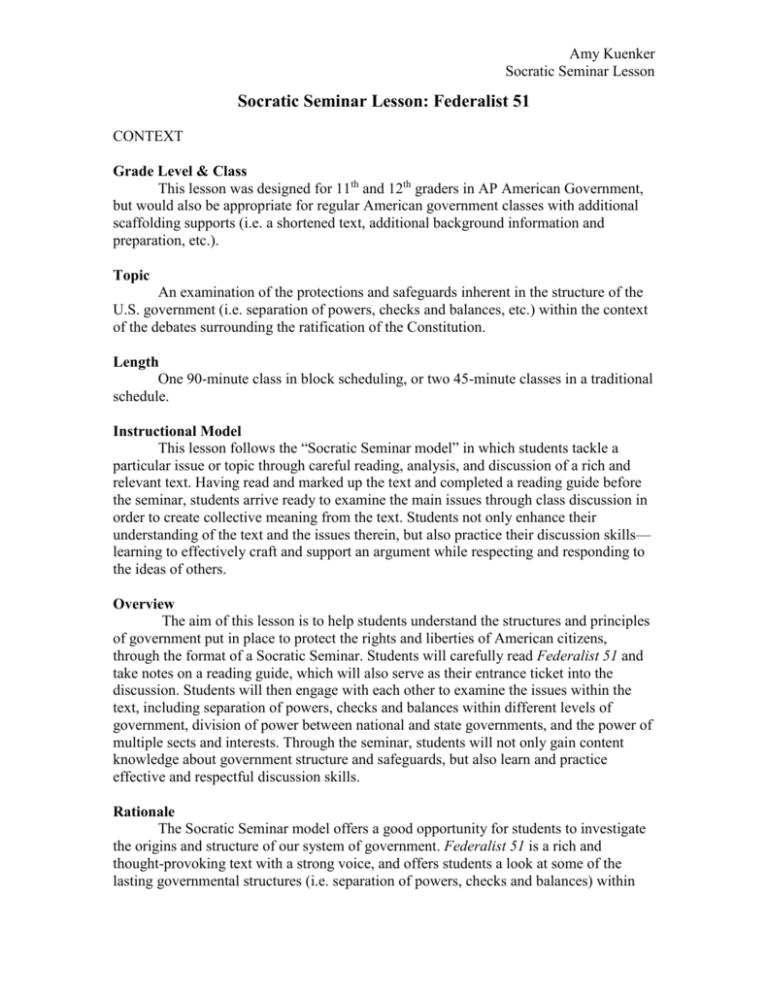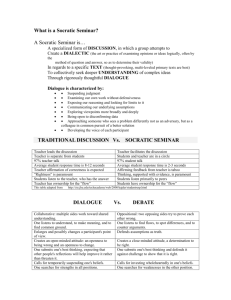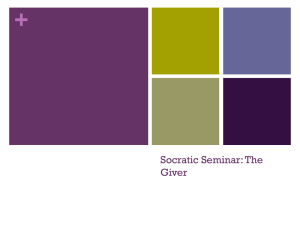Socratic Seminar Lesson: Federalist 51
advertisement

Amy Kuenker Socratic Seminar Lesson Socratic Seminar Lesson: Federalist 51 CONTEXT Grade Level & Class This lesson was designed for 11th and 12th graders in AP American Government, but would also be appropriate for regular American government classes with additional scaffolding supports (i.e. a shortened text, additional background information and preparation, etc.). Topic An examination of the protections and safeguards inherent in the structure of the U.S. government (i.e. separation of powers, checks and balances, etc.) within the context of the debates surrounding the ratification of the Constitution. Length One 90-minute class in block scheduling, or two 45-minute classes in a traditional schedule. Instructional Model This lesson follows the “Socratic Seminar model” in which students tackle a particular issue or topic through careful reading, analysis, and discussion of a rich and relevant text. Having read and marked up the text and completed a reading guide before the seminar, students arrive ready to examine the main issues through class discussion in order to create collective meaning from the text. Students not only enhance their understanding of the text and the issues therein, but also practice their discussion skills— learning to effectively craft and support an argument while respecting and responding to the ideas of others. Overview The aim of this lesson is to help students understand the structures and principles of government put in place to protect the rights and liberties of American citizens, through the format of a Socratic Seminar. Students will carefully read Federalist 51 and take notes on a reading guide, which will also serve as their entrance ticket into the discussion. Students will then engage with each other to examine the issues within the text, including separation of powers, checks and balances within different levels of government, division of power between national and state governments, and the power of multiple sects and interests. Through the seminar, students will not only gain content knowledge about government structure and safeguards, but also learn and practice effective and respectful discussion skills. Rationale The Socratic Seminar model offers a good opportunity for students to investigate the origins and structure of our system of government. Federalist 51 is a rich and thought-provoking text with a strong voice, and offers students a look at some of the lasting governmental structures (i.e. separation of powers, checks and balances) within Amy Kuenker Socratic Seminar Lesson the authentic context of the Constitutional ratification debates. Though the text is written mainly from one perspective, it nevertheless addresses the other side through persuasive strategies. Finally, the issues discussed therein were hugely significant for the time, and remain relevant even today as the country continues to debate the role of government and its division of powers. Having a Socratic Seminar on Federalist 51 is well worth the time, not only for the content knowledge students will gain, but also for the practice they will receive in effective and respectful discussion, and the skills they will develop in critical thinking, textual analysis, and position development/support. Background Information This lesson will appear towards the beginning of the course during the unit on the Constitution and the Ratification Debates. Before encountering the text, students will be exposed to the perspectives and concerns of the Federalists and Anti-federalists, will understand the weaknesses of the Articles of Confederation, and will learn about the Constitutional Convention. Students will be provided with a certain amount of context before being given the text, especially in regards to the public debate in newspapers and pamphlets during 1787-8 about the proposed Constitution. Objectives After this lesson, the student will be able to do the following: Academic 1. Demonstrate an understanding of Federalist arguments for how the structure of the national government protects the rights and liberties of the people. (GOVT4.a; NCSS Theme 5) 2. Understand the document’s role and importance within its historical context. (GOVT1.a) 3. Identify and describe the importance of: a. separate branches of government; b. checks and balances (within different and the same levels of government); c. division of power between the national and state governments; d. a multiplicity of interests within a society. (GOVT4.c; NCSS Theme 6) Intellectual 1. Analyze a text to determine 1) the author’s message and 2) how the author develops and supports his/her argument. (GOVT1.a) 2. Practice effective discussion skills by developing, presenting/articulating, and supporting his/her own position. (NCSS Theme 4) 3. Practice respectful discussion skills by listening and responding to the ideas of others. (GOVT17.b) ASSESSMENT 1. The teacher will informally assess student understanding by checking to see that they have completed their entrance ticket, and by monitoring the participation and quality of responses during the discussion. Because the discussion may go in unforeseen Amy Kuenker Socratic Seminar Lesson directions as the students work to collectively create meaning, the teacher may be assessing more skill development than content knowledge during the discussion. In monitoring participation, the teacher should observe how students adhere to the expectations for the discussion, how they build on peer responses, and how they use evidence from the text. 2. The teacher will also assess students through the exit ticket, which provides students both a chance to review their knowledge of the text as well as to reflect on the discussion and their participation in it. This means of assessment will help the teacher to see how students understood the text and the extent to which they felt comfortable participated during the discussion, as well as an opportunity to provide students with feedback, both on their content understanding and their performance in the seminar. 3. To make sure students understood the important issues raised in the text, the teacher can review, or have students review, Madison’s main arguments. The teacher can summatively assess student understanding of these issues through questions on quizzes or class tests. CONTENT AND INSTRUCTIONAL STRATEGIES Resources 1. Federalist 51 text (a copy for each student) 2. Reading guide graphic organizer (one for each student) 3. Discussion expectations (posted for students to see) 4. Video of discussion to model norms/expectations (and equipment to play it) 5. “Quote Strips” for warm-up activity 6. Teacher’s own marked-up text, with a brief list of important topics/issues 7. Opening question, as well as core and follow-up questions 8. Student roster for making notes on participation Seminar Text Federalist 51 (The Structure Of The Government Must Furnish The Proper Checks And Balances Between The Different Departments) by James Madison. Opening Question: What is Madison’s purpose in writing this essay? (Potential follow-up: how does he reassure people that the government structure will safeguard the rights and liberties of citizens?) Core Questions: What does Madison mean when he says government is “the greatest of all reflections on human nature?” Why is Madison concerned about a “gradual concentration of the several powers in the same department” of government? How does Madison claim that the rights of the minority will be protected under the new government? Amy Kuenker Socratic Seminar Lesson Potential Follow-up Questions: Do you think Madison’s provisions have effectively controlled against the abuse of power in government? Would Madison agree more with the philosophy of Locke or of Hobbes? What does he seem to believe about human nature? Do you think Madison’s arguments successfully allayed the fears of Antifederalists? If you were an Anti-federalist, what questions or concerns would you still have about the national government? Preparation for Seminar Text To prepare for the seminar, students will be given the text several days in advance; while not long, the reading is somewhat dense, so students should have at least two days outside of class to work through it. Students should carefully read and annotate the text, honing in on the author’s main arguments and marking passages they find particularly salient in support of these arguments. Along with the text, students will receive a reading guide to focus their note taking, which will also serve as their entrance ticket to the discussion. Discussion Skills The day before the seminar, the teacher will play a clip of a Socratic Seminar from the previous year’s discussion (or an example from TeacherTube). Students will be asked what best practices they witnessed in the video that facilitated good discussion (and what students could improve on, if appropriate for the clip). The teacher will compile a list of these norms/expectations on the board, including any other suggestions students have for effective participation in discussion. These expectations will be briefly reviewed on the day of the seminar, and posted in the classroom for student reference. Expectations and/or norms for discussion should include, but are not limited to the following: Come prepared, having carefully read and marked up the text, and completed the entrance ticket Speak loud and clear so all can hear Provide evidence from the text to support your assertions Listen to others and respond with respect (critique ideas, not individuals) Respond to your peers, not to the teacher Try to build on the statements of your peers (develop shared understanding) If students do not complete the entrance ticket they may not participate in the discussion. They will still sit in the circle, but instead will be responsible for taking minutes of the discussion, which will be turned in to the teacher. Students must still complete an exit ticket, which will be turned in and graded. Room Arrangement 1. Before students arrive, the teacher should arrange desks in a circle or semi-circle, so that all students can see each other during the discussion. Amy Kuenker Socratic Seminar Lesson 2. The teacher should have the discussion norms/expectations displayed in a prominent location for student reference. Procedures for Seminar Hook 1. Students will find on their desks a strip of paper with a quote from Federalist 51. To warm them up for the discussion, they should turn to the person sitting next to them and describe the meaning of the quote and its significance within Madison’s larger arguments. 2. While students are “warming up,” the teacher should walk around the room to check entrance tickets to determine that students can participate in the seminar (students who did not complete the ticket will take minutes). Seminar 1. After briefly reviewing the expectations for discussion and checking students’ entrance tickets, the teacher will post the opening question for the discussion. 2. If students are having trouble getting started (after employing proper wait time), the teacher can use a think-pair-share strategy and ask students to tell what they talked about with their partner. 3. Once the discussion has “taken off” and students are responding to each other, the teacher should sit back and observe the discussion, making notes on student participation (not for a grade, but for the seminar debrief), on what topics have been covered and what still needs to be touched on, etc. 4. The teacher should intervene to drive students back to the text, to remind them about discussion norms, to redirect them back to the topic, to encourage participation, or to ask follow-up questions that prompt students to investigate deeper into the issue. 5. When discussion on one question comes to a lull, the teacher should pose another core or follow-up question. The teacher should let the students pursue productive lines of interest, but also work to encourage them to touch on all essential issues. Post-Seminar and Debrief Debrief 1. After the seminar, the teacher should facilitate a debriefing of the discussion (allow at least 15 minutes for debrief and exit ticket). Again, the teacher should pose a question (“What went well in this discussion, and what could we improve on for next time?”) and let the students discuss with each other. Exit ticket 1. Students will be asked to prepare an exit ticket before leaving class, or for homework (depending on time). Students should address the following questions: What did you think was Madison’s strongest/most persuasive argument in Federalist 51, and why? Do you think he accomplished his goals? What points brought up in discussion did you find interesting? What statements did you particularly agree or disagree with, and why? How do you feel you performed in the discussion? What is something you will work on for our next seminar? Amy Kuenker Socratic Seminar Lesson Was there anything you wanted to say in the discussion but did not have the chance? Differentiation As a seminar discussion focused around a rich text, this lesson provides inherent differentiation for different kinds of learners to gain an understanding of the material; those who are more visual benefit from interaction with the text, and those who are aural learners will gain an understanding of the material through the class discussion (though hopefully all will benefit from this, as we work together to create new meaning). The lesson works for students with different knowledge backgrounds because it starts them off on level footing; in-class preparation will provide context for the text, which forms the basis of the seminar (students can pull in outside information, but are not required to). Students are given several days to read the text, for those who might require additional time, and are provided with a graphic organizer as a way to organize their thinking in preparation for the discussion. In terms of learning skills for the discussion, students will be shown a video that will serve as a model for the discussion. From there, they will extract the essential norms to follow, as well as brainstorm to supply any other expectations that may be missing. The expectations will be reinforced before the discussion both aurally (through a brief review) as well as visually (being posted for easy reference). Adaptation The language and relative density of the text may present some challenges for some students, particularly those with visual or perception disabilities or English language learners. To accommodate their needs, I can provide the text further ahead of time, supply a list of vocabulary, and even offer a summary to help guide students through the difficult diction and syntax. Since students take the text home to read, I would hope that those who need it read to them can get help from parents or siblings, but if not, they have time to work with a para-educator or meet with me during planning period. To assist all students to organize the information in their minds, as well as to prepare for the discussion, I supply each student with a reading guide graphic organizer. This strategy should also assist students to remember and recall the information, as will the “quote strip” activity for warm-up. Reflection The main issues in implementing this lesson will to be sure that students 1) can understand the text and 2) willingly participate in order to explore these issues in the discussion. My hope is that the background knowledge and context provided in class, coupled with the reading guide, will serve to make the text accessible to students. I will also work to reassure them that they do not need to understand everything in the text, but rather look to extract the main arguments and evidence supporting them. To encourage participation in the seminar, students will know that they are not being graded on their discussion performance, but rather just the pre- and post-seminar writing assignments. If students do not participate even with sufficient wait-time, I will have them talk with a partner or in small groups, and then share something their partner said, in order to get the discussion “rolling.” Amy Kuenker Socratic Seminar Lesson By reviewing the norms and expectations for the discussion ahead of time as well as in the exit ticket, I hope that students will be self-reflective of their performance during the discussion. However, if some students are dominating discussion, I may simply ask to hear some opinions from people we have not yet heard from, or I can also use the “postit” strategy, in which students are given 2-3 post-its, and surrender one each time they talk; once out of post-its, students cannot say anything until everyone else has gone through some/all of theirs as well. To encourage students to prepare for the discussion, I make the consequences of not completing the entrance ticket tedious, though still productive (students must take minutes of the discussion). If the students get too far off track or are not using textual evidence to support themselves, I reserve the right to interject in the discussion with follow-up questions, asking where they see that in the text, etc. Amy Kuenker Socratic Seminar Lesson







